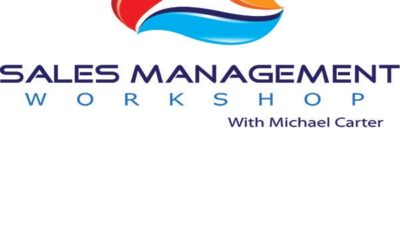Welcome to the Sales Management Workshop Podcast
Audio podcasts for sales managersThousands of people have downloaded and listened to the podcast all around the world. From the comments, we have received, found these podcast to be very valuable.
Click on the player, and you can listen on your computer at home or work. If you prefer, you can download a podcast and listen on your mobile device.
To insure you never miss and episode, you can subscribe on iTunes, Stitcher or Miro
If you like the podcast or have some suggestions, get in touch. Let me know your thoughts, and if you have time, give us a rating on iTunes. Enjoy.
SMW_011 Introduction – Sales One-On-Ones
Podcast: Play in new window | Download (Duration: 26:41 — 24.5MB)
Subscribe: RSS
Sales one-on-ones are your key to effective sales management
Effective management requires effective communication. The best tool you have in your magical management tool bag are the weekly sales one-on ones you have with each of your salespeople. If you want to have your salespeople functioning at the top of their game, You have to help them. Today we’ll talk about the process of doing your sales one-on-ones. read more…
SMW_010 Field Sales Coaching, The Ride Along And The Coaching Process
Podcast: Play in new window | Download (28.5MB)
Subscribe: RSS
The Key to Sales Field Coaching Is Leadership
The job of a sales leaders and manager is to serve. George S. Odiorne, developer of a management concept that became popular with businesses around the world, said, “Coaching isn’t an addition to a leader’s job, it’s an integral part of it.” read more…
SMW 009 How Sales Managers Can Use Time Management to Reach Their Goals
Podcast: Play in new window | Download (Duration: 26:02 — 23.9MB)
Subscribe: RSS
Time Management Is The Key
Time management is critical to your sales management success. With all the demands a sales manager has tugging at them each day, how you manage the time you have is extremely important. For the sales manager to be effective, you have to keep your goals front and center so they don’t get lost in the shuffle. Prioritize. read more…
SMW 008 Team Coaching – The Sales Meetings
Podcast: Play in new window | Download (Duration: 23:16 — 21.4MB)
Subscribe: RSS
Use your sales meetings to bring value to your sales team
Sales meetings represent a great opportunity for you to coach your sales team if you conduct them properly. In this podcast we look at how to plan and conduct your sales meetings. read more…
SMW 007 Do You Own Your Sales Process
Podcast: Play in new window | Download (Duration: 33:29 — 30.7MB)
Subscribe: RSS
The Sales Process
In simple terms, the sales process is nothing more then an outline of the how you move the sale from one stage to the next, hopefully to a conclusion that is good for both you and the customer.
Owning your sales process is key to producing manageable repeatable results. read more…
SMW 006 Sales Recruiting – Hire The Right Sales Person Part Three Sales Onboarding
Podcast: Play in new window | Download (Duration: 28:11 — 25.9MB)
Subscribe: RSS
The all-important sales onboarding process. Your job now is to get your new salesperson started the right way. You have been through a long and exhaustive process to find the right salesperson for your sales team. They’ve accepted your offer and now is where the work begins.
This is the third podcast in our ‘Hiring’ series. If you missed the prior two podcasts, Sales Recruiting – Hire The Right Sales Person Part One or Sales Recruiting – Hiring The Right Sales Person Part Two, be sure to check them out.
The first thing you should realize is that when a new salesperson starts with the organization, there is going to be ‘ramp up’ time. This is the time it will take for that new salesperson to be able to produce the level of revenue that you deeply desire. The goal of your onboarding program is to provide them with the information they’ll need in order to be successful. You also want to fully integrate them into your organization. You also want to reduce the time it takes to make them productive.
(Updated February 27, 2018.
The show notes for this podcast have been updated from the original but not the podcast itself. I wanted to include more information than had originally been posted. I felt it would be helpful as we look back at some of the most important and useful concepts for a sales manager.)
Sales Onboarding Is Not A 1 Day Program
A lot of people think that sales onboarding is simply having the correct paperwork to fill out. That’s only a part of it. Some say that it’s all about downloading as much information as you can in a couple of days and then just throwing them into the field.
For new salespeople, loading them down with too much information in too short a period of time is like trying to drink from a fire hose. At the end of their first week they’re completely overwhelmed, lost and ready to look for a new job.
Look at sales onboarding as a development program which could last 30, 60, 90, or even 120 days. During this time you want them to be fully integrated into your organization. Your objective is to offer them the tools they will need to produce the level of revenue that you’re expecting. You also want to build a truly valued member of the team. You want the revenue. You want sustainable, repeatable revenue. A good onboarding process gives you that.
You Only Have One Shot
It’s only when a new salesperson comes on board that you have a chance to make a real difference. Use this time to provide them with the tools they’ll need to be successful and become invaluable members of your organization. You want revenue. You want revenue that’s sustainable and repeatable. That’s what a good onboarding process gives you. Your sales onboarding process should result in:
- Minimized ‘ramp-up’ time
- Minimized turnover within your sales department
- A bigger return on your investment.
- Developing stronger sales results
- A more loyal and engaged salesperson
- Development of an individual who brings true value to your organization along with the added revenue.
You invest time, energy, and money to find the right salesperson. The last thing you want is to turn them off in the first 90 days. Take the time to get them started the right way.
What Does Your New Salesperson Need To Know?
Large companies do a pretty fair job at giving new employees the basics. They show them how use the company’s email systems. They’ll setup and show them how to use voice mail. They show them where the office supplies are located. They’ll throw in some product training and maybe a little sales skill development.
When you look at the smaller companies, it’s not quite the same. In smaller companies, ‘onboarding’ may not even exist. They try to find a salesperson who can ‘hit the ground running’. The reality is even experienced salespeople need your leadership and support to really be successful.
Mostly, new hires are left to learn on their own. They’re supposed to learn by asking others, by employing a process of trial-and-error. This commonly leads to unsatisfactory sales results, low morale, and a very high turnover rate.
So how do we make sure that our new salespeople get started right? You develop an ‘onboarding’ program to help ensure success.
As a manager you want your new salespeople to feel that the decision they made to join your organization was the right decision from ‘day one’.
First, determine what exactly they will need.. Look at the specific work you did in determining what you wanted this sales person to do. Look at the job description that you developed. Do you see why planning is so important?
You want to provide your new salesperson with the specific knowledge they will need to be successful. Start off by creating a list of what they’ll need to know.This is based on what is normally required along with any additional info that you require.
For example build a list based on the following 6 categories:
- Administrative
- The Company
- Products and Services
- Sales Position
- The Customers
- Support
Your list might be longer or shorter. This list of six items should give you the basic idea.
In a 90-day onboarding program there are roughly 13 weeks of training and development. Decide what needs to be accomplished in each of these 13 weeks.
After you’ve divided the onboarding content into a weekly schedule, decide what will happen on each day. Divide it all into a weekly schedule.
Here is how to arrange the content for the six (6) categories listed above:
1. ADMINISTRATIVE
- New hire paperwork
- Drug testing
- Background check
- Driver licenses review
2. THE COMPANY
- Understand the Company’s history, structure, values and purpose
- Understand how to use the company’s email systems, voice mail, location of office supplies, and sales material
- Understand the tools such as your CRM system, reporting systems, standard contracts and established proposals generating practices
- Know and understand the company advertising programs, promotions and web site
- Understand company’s compensation program and their individual quota’s, by month, quarter and for the year
- Has visited and met all department heads in a formal setting to best understand their roll and how they interact with sales
3. PRODUCTS AND SERVICES
- Understand your products and services, and pricing
- Understanding of features and benefits of each product and service by application
- Has the ability to cost justify products and services
- Understands and can present Products and Pricing
- Has attended product training in person or online
- Understanding of the delivery or installation process of the product
- Has performed ‘ride-alongs’ for product delivery or installation if applicable
4. SALES POSITION
- Can effectively present the company’s USP
- Understands and can explain the company’s sales process
- Can perform a product presentation – this is a role play with you before you let them out into the field alone and thereafter on an ongoing basis
- Understands their assigned territory and customer base
- Has performed ‘ride-alongs’ to listen in on prospecting calls, client visits, and presentations
- Development of a Territory Planner
- Can effectively perform a company presentation in a 5 minute role play
5. THE CUSTOMERS
- Has developed a clear understanding of the buyer
- Understands why they are our customers
- He/she understands who our customers are attracted to
6. SUPPORT
- Select a mentor for technical issues
- Select a mentor for sales development
- Selects a mentor for administrative duties
Conclusion
- When new people come into any organization, they have lots of paperwork to fill out. Why not get started early? You can send the necessary paperwork after signing the ‘offer’ letter. This way they aren’t wasting time being buried under a mountain of paperwork.
- Letting everyone in the office know to be prepared to welcome a new salesperson.
- Provide a name plate on his or her desk or office door as a clear indication that you’ve prepared the space for them.
- Set up their computer ahead of time, so it’s ready when they arrive.
- Configure the new member’s e-mail accounts.
- Provide guidelines for any essential software he or she will need to use.
- Set up their phone system, and provide instructions for using voicemail.
- Have a stack of business cards printed and waiting.
- Introduce them to their mentors for each area and schedule time for them to meet within the first couple of days
There is a lot for you to do if you want to help your new salesperson become truly successful. I hope this information is helpful. If you would like some help developing your onboarding process, I would be happy to help.
Ask Questions And Share Your Feedback
- Subscribe to our Newsletter To receive additional information
- Email @SalesManagementWorkshop.com
- If you have a chance, please leave me an honest rating and review in iTunes. It will help the show and its ranking. I appreciate it !!!! Thanks and I hope you enjoyed the show!
- Join the Facebook Page
- Follow @mcsalesworkshop









